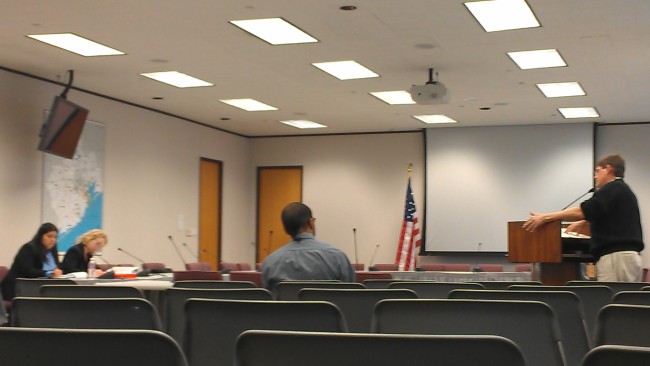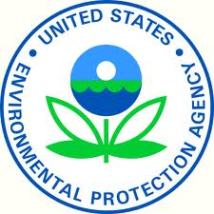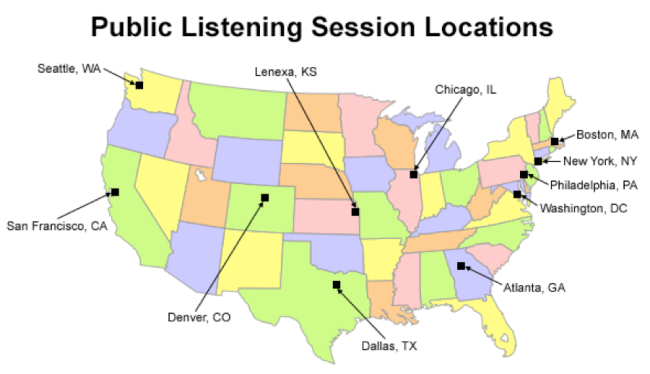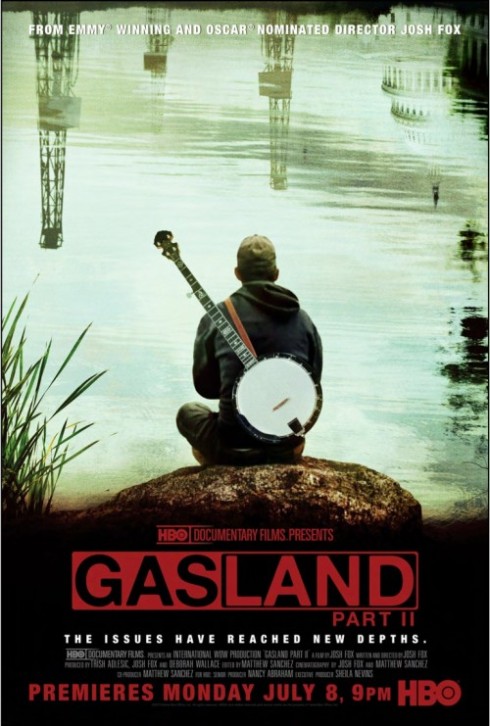How Two Texas Regulatory Agencies Have Embraced Industry Interests Over Citizen Concerns and Public Health
By Dave Cortez and Dewayne Quertermous
This feature was written following two hours of public testimony at an Arlington, Texas town hall regarding the Sunset Review of the Public Utilities Commission and Railroad Commission of Texas – two agencies tasked with regulating electricity, telecommunications, oil, and gas industries, among others. Organized by the Greater Fort Worth & Dallas Sierra Clubs and Public Citizen, the event served as a citizen’s communication forum for North Texans to speak directly to State Representatives Jim Keffer (R-Eastland) and Rafael Anchia (D-Dallas). We thank both of them for their participation.
To submit comments directly to the Sunset Advisory Commission, please email sunset@sunset.state.tx.us
Last week, more than 80 concerned citizens gathered in Arlington to present passionate testimonials about their experiences with two major state regulatory agencies: the Public Utilities Commission (PUC) and the Railroad Commission (RRC). From concerns about the PUC’s failure to implement state renewable energy mandates and the need to develop net-metering rules for solar, to the financing of campaigns for Railroad Commissioner and the RRC’s track record of neglecting citizen concerns over fracking and tar sands pipeline construction, one unmistakable theme repeated throughout the night was that they are tired of these agencies operating largely by and for polluting industry interests, and not for the public good.
On December 19th, many of these same North Texans will be joining with other concerned citizens from around the state to relay their personal stories of struggle and frustration with the PUC and RRC directly to members of the Sunset Advisory Commission – a 12 member legislative body tasked with the 12 year review to determine the need for an agency, looks for potential duplication of other public services or programs, and considers new and innovative changes to improve each agency’s operations and activities.
(Click here for location, meeting time, and Sierra Club’s comments on the PUC & RRC Sunset Review.)

RULE 37 , EMINENT DOMAIN, AND
Avoiding RENEWABLE ENERGY
Of the more than forty speakers, many criticized the RRC’s lax regulation of the oil and gas industry, especially regarding fracking for natural gas and oil. While there was praise for the Fracking Fluid Disclosure Bill passed in the 82nd legislative session, and the RRC’s quick implementation of the law, as well as a few other fracking related regulations the Commission has strengthened, any positive recognition was always followed by a litany of air, water, public health, and safety concerns.
The Commission’s willingness to let industry have virtually free reign to frequently use the Rule 37 exemption, allowing them to take a mineral owner’s minerals without a lease and with little if any remuneration, came up often throughout the night. A common sore point was that Rule 37 hearings are not held locally but in Austin, forcing landowners to travel to Austin for a hearing that may be rescheduled at the last moment in order to protest what is usually a rubber-stamp approval for the industry.

Numerous speakers were frustrated by pipeline companies’ abuse of their eminent domain powers, which they get by simply checking a box on a form saying they are a ‘common carrier’. A sustained stream of outraged speakers cited concerns that the RRC does nothing to confirm the veracity of this statement, much less set any criteria for what constitutes a ‘common carrier’, whether associated with gas and oil drilling or with tar sands pipelines. The fact that once they receive ‘common carrier’ status, virtually no limits are placed on the use of eminent domain by a private company, left many incredulous.
“There’s no box to mark or delineate tar sands on the T4 form at the RRC. Tar sands is unlike conventional crude, Syncrude, or Venezuelan crude,” said event organizer Rita Beving. “These tar sands companies get a federal IRS exemption as they have determined with the IRS that dilbit or tar sands is not crude, and therefore are exempt from paying into the U.S. spill liability fund. Still this company marks their T-4 at the RRC that they are “crude”. What is Texas to do should there be a spill? Who is going to bear the liability? The counties? The state?”
The PUC was not spared by the wave of criticism from speakers. In reference to a petition filed by the Sierra Club and Public Citizen in September, citizens wanted to know why the PUC has maintained a 7-year position that the implementation of a 500 megawatt renewable energy mandate would harm Texas electricity consumers, when many saw it as an efficient means to achieve energy independence and create jobs.
“The recent denial to hold public meetings for a petition to act on the non-wind RPS, and in documentation on a commission website that compares the capital cost of a natural gas plant to the total cost of a solar PV plant and then declares solar too expensive indicates a bias that needs to be removed or an analysis that needs to be improved,” said Larry Howe of Plano.
CONFLICTS OF INTEREST AND CAMPAIGN COFFERS
Although audience members expressed their frustrations with the PUC’s deference to industry lobbyists and utility stakeholders, the fact of the matter is members of the PUC are unelected and therefore lack sufficient means for public accountability. The 3 commissioners are appointed by Governor Perry – who ironically enough signed Senate Bill 20 into law in 2005, which established a mandate for 500 mws of “non-wind” renewable energy such as solar and geothermal power.
But commissioners at the RRC are publicly elected. Members of Clean Elections Texas were on hand to present testimony highlighting the need to reform the system of financing campaigns for seats at the RRC.
“It isn’t just that 1) there’s been an explosion of campaign spending in RRC races in the last ten years, 2) that most of the money comes from people in industries with business before the commission, 3) that commission candidates raise significantly more than candidates for comparable agencies, 4) that there is no limit to how much any single interested party can give to a commissioner, or 5) that most of the high dollar contributions come from individuals in regulated industries…it’s that some of the campaign contributions simply cannot be explained as an effort to affect the outcome of an election,” said Joel Page of Clean Elections Texas.
Further analysis and review of testimony shows that the volume and source of money flowing into campaigns for the RRC – as documented by a 2010 study by Public Citizen – suggests an effort to buy influence over the Commission. Between 2000 and 2010, money raised and spent by incumbent commissioners increased nearly seven fold; in the 2008 cycle, incumbents spent more than 3.5 million dollars. The amount spent by industry sources – energy companies, their employees, as well as consultants, attorneys and lobbyists – has steadily increased as well.
Problem is: campaign finance reports show that much of the money raised by candidates for RRC goes unspent. This begs the question, “why would donors give candidates more money than they need to run a campaign that receives relatively little public attention?”
IMPLEMENTING REFORM AND
MOVING TOWARD A CLEAN ECONOMY

There’s no doubt that Texas is an oil & gas state. While our economy is rooted in the days of Spindletop and wildcatting for Texas crude, there’s no reason assume that clean air and water are mutually exclusive to economic and energy development. Texans are proud of our rights to personal property, our independence, and the idea that we can lead in more than low-wage jobs and carbon pollution.
But when our appointed and elected leadership at the PUC and RRC fails to listen to legitimate grievances from of its own citizens, to respect state law, to protect private property rights, to prioritize transparency & accountability, and to tap into the most abundant renewable energy resource in the nation (the Texas sun), prudence dictactes a greater and more vocal response from the people whom these agencies are tasked to represent and protect.
Send in your comments to the Sunset Advisory Commission, and your State Senator and Representative. Want to build a local clean economy team in your area? Get started by taking 5 minutes to complete this short survey.
There’s no more compelling case for action and reform than your personal story. However, if you’d like to review talking points and more details of the Sierra Club’s and Public Citizen’s comments on the PUC Sunset Review click here. For talking points and more detail on the Sierra Club’s comments on the RRC Sunset Review click here.
Below is a photo essay featuring all of the speakers at the Arlington town hall. Click on photos to see quotes from the testimony given that night.

Rita Beving, Farmers Branch, TX “There’s no box to mark or delineate tar sands on the T4 form at the RRC. Tar sands is unlike conventional crude, Syncrude, or Venezuelan crude. These tar sands companies get a federal IRS exemption as they have determined with the IRS that dilbit or tar sands is not crude, and therefore are exempt from paying into the U.S. spill liability fund. Still this company marks their T-4 at the RRC that they are “crude”. What is Texas to do should there be a spill? Who is going to bear the liability? The counties? The state? … If you go to stopseawaypipleline.com, you will see medical facilities, nursing homes, at least 56 churches, schools, all within a mile of this pipeline…. We need to do something to protect our state. When I met with Mr. Smitherman at Represenative Keffer’s urging, he attended 5 minutes of a 45-minute meeting. He walked in and said, ‘I just want you to know, I support Keystone.’ He spent 5 minutes with us and left. I don’t call that very responsive.”

Gary Stuard, Dallas, TX “Thousands of us feel that our state government is not for us. And the agencies that are supposed to be there for us don’t care and are controlled by business. The RRC has made it clear that public safety is of no concern for them. I support common carrier and eminent domain reform. Given the realities in this state, we feel that these agencies allow people’s rights to a healthy environment to be trampled, particularly with regard to the Keystone and Seaway pipelines. I hope you know that there are thousands of Texans who feel that these agencies are at war with us. People are dying, have died, and will die if these agencies continue to run roughshod over people’s lives.”

Reps. Rafael Anchia (left) and Jim Keffer (center) listen to introductory remarks by Dewayne Quertermous (right)

More than 80 residents attended the town hall

Rita Beving of Public Citizen explains the Sunset Review process to audience members.

Reps. Rafael Anchia (D-Dallas) and Jim Keffer (R-Eastland) offer introductory remarks before listening to nearly two hours of citizen communication.

David Griggs, Farmers Branch, TX “You know the facts of a foreign company using and abusing our laws to sell a product to another foreign company. The objective of the special commissioners is to make sure the fair market value of that land is given to that landowner. And to be in that process, the landowner whose land is being taken has to present appraisal to compete with the state’s appraisal and in many cases higher an attorney to present his or her case. That’s not happening in East Texas. Right now there are a number of people who were threatened by the foreign companies to give up their land, who were not aware of the process and therefore didn’t have that opportunity. Others who had the opportunity didn’t have the economic means to fight back. With regards to pipelines… this is a broken system. When you talk to your colleagues, remind them of the common folks who are being abused by the system.”

Bob Fusinato, Richardson, TX “From my layman’s point of view, it seems that prices are only loosely coupled with the cost of producing it… Prudence would dictate that we develop renewables more aggressively, but with the deregulated nature of Texas’ wholesale energy market it is not likely to happen in optimal fashion. As a minimum, the Texas Legislature should make the 500 mw non-wind renewable standard a mandatory requirement and develop universal rules for net-metering. From the Rocky Mountain Institute: ‘The most important new source of competitive advantage in today’s rapidly changing electric sector is not technology or market position, it is the ability of innovators to work efficiently and effectively in multi-stakeholder environments.”

Tolbert Greenwood, Ft. Worth, TX “The politicization of these agencies has resulted in them failing to meet their basic mission statements. They have become spokesmen for industry. Objective republicans, democrats, conservatives, liberals all recognize that these agencies have not been given the funds or independence to do what is necessary to protect the citizens of Texas.”

Sharon Wilson, Decatur, TX “The RRC is doing a poor job of regulating the oil & gas industries. 296,000 active oil & gas wells went uninspected in Texas last year…I worked in the industry for 12 years. I am a mineral owner and was a landowner in Wise County where I lived with the Barnett Shale development for 16 years. During that time I had a great deal of first hand experience with the RRC…Citizens report that their complaints to the RRC are often met with contempt, skepticism, or ridicule. The investigations that follow up are unprofessional and unsatisfactory. Texans have lost faith in the Railroad Commission and it is a top-down problem. The RRC serves all Texans regardless of their political beliefs, yet Commissioner Smitherman is banning concerned citizens from commenting on his Facebook page.”

Map listing fracking wells in North Texas region.

Larry Howe, Plano, TX “It seems to me that the PUC is intentionally putting the blinders on with regards to tapping the untapped natural resources in Texas: the sun. Distributed generation by rooftop solar is a powerful consumer choice option that should be enabled & promoted by the PUC. However, the recent denial to hold public meetings for a petition to act on the non-wind RPS, and in documentation on a commission website that compares the capital cost of a natural gas plant to the total cost of a solar pv plant and then declares solar too expensive indicates a bias that needs to be removed or an analysis that needs to be improved. Furthermore, the PUC needs to improve transparency when an organization files comments and the Commission then uses those comments as basis for their finding or ruling…This transparency could be provided by the commenter, or the PUC could ensure that public information is available before they cite these comments in their findings.”

Mike Renner, “In 2007 the Texas Legislature directed the PUC to ensure fair payments were made to customers with small on-site solar projects and the excess electricity they generated back into the grid. Since then, the PUC has failed to adopt clear rules requiring all utilities to pay fair market prices…Net-metering will ensure everyone has a level playing field and help grow the on-site renewable market and create jobs. Find a bill that puts everyone on a level playing field. The PUC is currently trying to address the problem of peak demand. Solar could be best used to meet that peak demand. But right now, by not having net-metering the PUC is preventing me from helping meet that demand with my home solar array.”

David Jones, Dallas, TX “We believe that there is a very important issue with the RRC sunset process regarding conflicts of interest and the way campaigns for Railroad Commissioner are run. The Commission unfortunately has become a stepping-stone for folks interested in higher office. It has become a place where large campaign contributions are given largely by industry, and there is a huge industry presence. As much as 85% of contributions to these elections are from people in industry or industry lobbyists. As part of the Sunset process, we ask that you look at the way campaign contributions are handled at the RRC.”

Jerry Pikulinski, Arlington, TX “I’m a retired federal economist. The report of the Texas Oil & Gas Accountability Project suggests lawlessness, absolute lawlessness, disregard for the regulatory authority and a failure to provide adequate enforcement. Local government tries to deal with this, but is compromised by a lack of competency and the fact that tens of millions of dollars are paid to local government entities.”

Kim Feil, Arlington, TX “The RRC is supposed to manage and not waste the state’s minerals, yet delegates enforcement to the TCEQ which does not even measure methane in their readings. For 3 years I’ve studied the side effects of urban drilling by my home near Cowboys Stadium. I hope to have some luck fixing the loopholes in getting better silica dust controls or at least pressurized ventless flow back tanks in place of the old rural open hatch tanks being used in my neighborhood. We live less than half a mile away from these. The city and Chesapeake have been unresponsive to my requests about the use of these tanks so I could check the winds and evacuate my family if necessary. The PUC needs to facilitate non-fossil fuel energy development because our weather is becoming more severe. Sing it with me, ‘Old school fossil fuels, make a few of us rich and the rest of us fools!”

Susan Sullivan, Argyle, TX “From my first call to the RRC I was patronized, called pet names, and made to feel like my call was completely unnecessary. The first call I made was the day before a holiday. I was told to wait 4 days before I could get assistance, then I was told it would be a personal favor to me because I sounded very upset. During the entire experience I was insulted by the responses provided to me. If this is the way they are treating the public in general, how are you to believe they are serious about their job or anything that has to do with the public in general?”

Wes Sanderfer, Clean Resources, Ft. Worth, TX “Other states have taken what you’ve done with regards to the regulations you modeled. This vital industry has done a great job providing the vital necessities that you and I use every day. It has also brought many jobs to the region. If we regulate them too much more, we will all be in danger of losing these jobs. I do not want to rely on foreign countries for a resource that we have right beneath our feet.”

Chelsea Backer, Clean Resources, Ft. Worth, TX “Many of us support natural gas. While we should all be concerned about anything that can impact our environment, we should not take seriously the extravagant stories and criticisms about the natural gas process and the impact on our health and environment because natural gas has no greater impact on our environment than other industries. For example cement kilns and traffic are the main cause of poor air quality, not drilling. Natural gas is a clean and green energy source.”

Kathryn, Clean Resources “Given the extreme comments of some of the other speakers here tonight, I think it is important for elected officials to hear that we appreciate the Barnett Shale. Frankly, there is no amount of economic development that is worth ruining our environment. But in terms of shale gas, this tradeoff is a false choice presented by extremists who are frustrated that their preferred energy sources remain forever in the future while shale gas has become a reality. Don’t get caught up in the hysteria of those who have their own anti-energy agenda.”

Mary Kelleher, Ft. Worth, TX “In 2010, Enterprise products construction started building a natural gas transmission line and metering station about half the size of a football field next to my home. Incredibly the RRC has no setback requirement for these lines or metering stations. The blast radius for the transmission line is in excess of 700 ft and my home is only 65 ft from it. The blast radius for the metering station cannot even be calculated by the RRC because they have no record of the number of pipelines or psi of pipelines running to that facility. Both were constructed in a flood plain without required permits. Both were constructed in closed municipal landfill without required permits. The RRC claims they have no jurisdiction over either matter. If the RRC has no oversight over the construction of these facilities, how can they allow them to operate? My case is not the exception. I can only hope that things have improved since 2009, but I can’t bet my life on it. The RRC has already done this for me. All I can do now is hope and pray that you’ll protect other citizens by making necessary changes”

Mark McCord, Celina, TX “The claims of job creation in gas industry are lies. These jobs are 20-30 day jobs, not permanent jobs. Look at the record of the number of violations against companies where they have failed to meet requirements for safety. In all the cases of complaints filed at the RRC, only about 2 of them have been decided in favor of the citizens of Texas. The RRC is owned, funded, and made up by the oil and gas industry. They have a vested interest in protecting the oil and gas industry with no regard whatsoever for the health and safety of citizens.”

Helen Bush, Dallas, TX “I want clean air, clean water, and a quality of life for future generations. I believe in renewables and non-polluting resources. And I believe there is a huge amount of jobs and money in building greener homes.”

Zac Trahan, Dallas, TX “We’re concerned about provisions previous PUC Sunset bills that would give renewable energy credits to companies that burn recyclable materials and garbage. That would be a very negative thing to call that type of operation a ‘green’ energy… There was also a proposal to allow a coal-burning industry to allow any amount of wood chips or ‘biomass’ and call that a source of renewable energy in order to attach the resource to renewable energy credits… And regarding the disclosure bill, 1 in every 5 chemicals used by the gas industry is declared a ‘trade secret’. In fact, 19,000 different instances of trade secret exemptions have been given to gas companies in Texas since the passage of the bill. I hope you consider strengthening the disclosure bill to address this issue.”

Joel Page, Dallas, TX “The system of campaign financing for the RRC is undermining public confidence in the impartiality of the commission. The case for reform of campaign finance isn’t just that there has been an explosion of cash in RRC races or that much of the money comes from people who were once employed by the commission or by industries with business for the commission, but also that some of the contributions given can’t be explained as an effort to affect the outcome of an election. Rather, these are better explained as an effort to affect the behavior of commissioners once they are in office. It is not uncommon to read a campaign finance report to find that candidates have spent a small fraction of what they have raised. If donors are giving candidates much more than they need to win an election, then the logical explanation is that donors are trying to affect the behavior of the commissioner. Please enact a system of volunteer financing, and at a minimum enact contribution limits.”

Wendi Hammond, Plano, TX “Landowners are looking at a piece of land that has been in their family for generations with plans to retire, but are being offered about $1,000 or so dollars. They look into an attorney, but they’re looking at 1/3 of $1,000. There is a gross imbalance of power between the corporations who want to take a private citizen’s land and the private citizens themselves… The landowners need someone who can represent their issue. A public interest council could do that and ensure that the corporation does what is necessary and fair… Regarding land value: make sure that the first offer from corporations reflects a true value for their land”

George Mader, Dallas, TX “Since the deregulation of electricity in Texas, I have been with renewable energy providers. I’d like you to increase the renewable standards for the PUC. Right now my family and I choose to pay more for the all-wind option. As we drive out to Southeast New Mexico through Sweetwater. My 5 year old and 7 year old point to the windmills and understand that is where our electricity comes from. More can be done with solar to support distributed generation and net-metering.”

David Cory, “I’m concerned that 5% of the fluid ingredients in fracking are exempt from disclosure because they are classified as secrets. Any amount of lack of transparency is a problem. So, is the proprietary advantage that industry gains from obscuring what is being injected potentially into our groundwater worth the appearance of impropriety? Could the law be changed to exempt the proprietary protection of any activity that could endanger public health and safety? Please take a look into bringing some daylight into what could be a very serious for Texans.”

Ranjana Bhandari, North Arlington, TX “In the last two years, we have been offered payments for leases to drill under our home. I am an economist and my husband is a physicist, and we looked at the expected potential payoff and the documented risk, and decided not to sign a lease with Chesapeake. Because enough of our neighbors signed, the company was permitted a lease to drill in our neighborhood. The company used a Rule 37 exemption in order to gain permission from the RRC to drill under our home. Drillers have distorted the original intent of this rule, use it over and over again, and grab minerals that they do not compensate landowners for nor obtain consent for. 1,623 out of 1,628 requests to drill under Rule 37 w/out landowners consent have been approved by the RRC. This shows there is a gross imbalance of power at the RRC. When we ask for a delay due to business and work, the RRC tells us we are in violation of several rules, whereas Chesapeake is granted delays w/ ease. Our children cannot breathe money. They need the clean water and clean air.”

Gary Hogan, Ft. Worth, TX “The RRC can’t be beholden to the industry giving them campaign funds. We have had so many issues on Rule 37 and it is so difficult for residents to receive a fair play regarding that rule. They have to file a protest. Take time off work. Travel to Austin, And testify. The RRC needs to have some sort of forum for residents of North Texas to participate in the process closer to home… Operators are concealing information as to how much is produced off of these wells. RRC has this info, but it is difficult for landowners to find the info. This should be required information so landowners know they are being paid fairly.”

Molly Rooke, Dallas, TX “My family has owned land dating back to the 1830s, and have had oil & gas operations on our property for many years. We have had many dealings with the RRC and have been very frustrated. We see a lack of inspection and enforcement. Follow up is terrible. Funding is a big problem and more staff/inspectors are needed in the Barnett Shale. Most reporting is coming from citizens trying to address and rectify problems… Regarding pipelines, there need to be better emergency response plans that are review before construction, not after.”

Faith Chatham, “In developing oil & gas, the economic disparities between those who have and those who don’t in is deplorable. When drilling, companies will drill between two small houses when across the street they drill on a property owned by a school district. The schools have attorneys. Hispanic landowners, renters, and other low-income people don’t. We need to have a voice. We need counsel that will represent poor people, ordinary people.”

Tammie Carson, Arlington, TX “On behalf of my children and grandchildren, on behalf of your children and grandchildren, what legacy will we leave for the people we love most? Will there be clean water to drink? Will they play outside in the sun or will they be lying in hospital beds with their organs poisoned and cancerous? Sometimes when I go outside my home in Southwest Arlington the air smells like mothballs. This Earth belongs to all of us. We need to take responsibility for making this a better place. A clean and healthy world. Only when the last fish has been caught, the last tree has been cut, when the last river has been poisoned will we realize we can’t eat money.”

Cindy Spoon, Denton, TX “I watched a 78 year old woman be arrested for trespassing on her own property. If either of y’all were getting a gas line or pipeline drilled in your backyard and you didn’t want it there, we would be there to help you… I’m a tad bit younger than most folks here tonight, but I want you know that I am active, and my friends are involved politically. But I want to believe and I want my friends to believe that our voices and our futures will be listened to and valued more than a campaign contribution from industry.”

Will Wooten, Denton, TX “The extremists are the fossil fuel industries that are destroying our planet. I love being to right of many Republicans in the Texas House on eminent domain. People’s land is being stolen from them by a foreign corporation using our laws to put in a pipeline. A pipeline with which they are lying about its contents in order to get power of eminent domain. All of this lies under the jurisdiction of the Railroad Commission.”

Grace Darling, Arlington, TX “Its not enough to pay a fine. Some of these things are criminal acts. Regarding the PUC, we support the Sierra Club recommendations and believe that net-metering needs to be developed and that the PUC should increase its investment and promotion of non-wind renewable energy sources.”

Susan Read, Grand Prairie, TX “We’ve been through quite a journey over the past 2 and a half years, and I wouldn’t be doing this if I didn’t believe it was important. There are no state requirements for signage about pipeline or drilling work. You know who is regulating the completion reports at the RRC? Chesapeake or any other of the operators. The RRC is not signing off on these reports.”

Jane Lynn, Arlington, TX “When there’s a problem with an agency, we should look to the top. Now we have concerns that Chairman Barry Smitherman may be violating our 1st Amendment rights by suppressing free speech of those in our community whom have been harmed by the shale gas industry… Chairman Smitherman is politicizing the regulation of the oil and gas industry in our state when he’s supposed to be a regulator.“

Susan T. Cooper, Richardson, TX “I am horrified and appalled at Trans Canada’s behavior as they trash through the forests and farms of East Texas. They have arrested a woman for trespassing on her own farm, even though she never signed a any agreement with Trans Canada. What is worse is that the state of Texas is allowing it. It has not been proven that Trans Canada is a common carrier. We are thoughtlessly allowing a foreign oil company to destroy our state, threaten our public health, and abuse the power of eminent domain.”

Jan Sanders, Dallas, TX “The Sunset Committee has an opportunity, from a public policy point of view, to take a deep breath and hard look at the role of the Railroad Commission. The RRC is like the fox taking care of the chickens. We have a great opportunity for alternative energy, a great opportunity to stop the disaster of tar sands. I would urge our representatives to see the pictures of what is happening in East Texas and in Alberta. I feel for the landowners, and I feel for the Earth.”

Cody Meador, Oak Cliff, TX “The public must have confidence in an entity such as the RRC. It must be motivated to serve the public interest, and cannot be influenced by campaign donations. This is not possible by the current system of campaign finance. The amount spent by industry has steadily increased and exceeded 60% of the campaign contributions made in the 2008 election cycle…. If a system of public campaign finance is not achievable financially or politically, the Legislature should establish a limit on how much money an entity can give to a campaign.”

Hal Hickerson, Arlington, TX “I’m a lifelong resident of Texas. I’ve made several trips to Austin to speak with the RRC regarding saltwater injection wells. In North Texas these wells have exploded and burned., but the RRC continually approves these wells. I call them hazardous waste disposal wells. Problem is, the RRC says they don’t have enough inspectors to inspect these wells. So I say, if you can’t inspect them, don’t issue the permits. We’re tired of the RRC representing oil and gas, and not the people.”

Richard Guldi, Dallas, TX “I have a PhD in engineering, and worked as a process engineer for 36 years with Texas Instruments handling the most toxic chemicals we had. I’m absolutely appalled at the flagrant disregard for public safety by tar sands companies. Tar sands pipelines are inherently more dangerous than conventional pipelines because of their higher pressure, higher temperature, and 100-300 times higher etch rate of metal and stress fractures. Texas water treatment plants do not have the capability to detect or remove benzene or xylene – two carcinogens found in tar sands. 10% of water supply for 7 million people Fortunately, your committee can do some things to prevent disaster. Don’t let the 36 year old Seaway pipeline transport tar sands.”

Chris Guldi, Dallas, TX “I’m concerned about the Seaway pipeline in Colin and Rockwall Counties, where population has increased six-fold. A leak would let benzyne, xylene, and toluene dissolve in the water, and our water districts are not prepared to detect or remove those chemicals. The RRC is promoting the interests of highly profitable oil and gas industry over the interests of Texas residents. Why can’t the water districts use eminent domain to seize the pipeline and protect the people of Texas?

Anchia “If you have other comments, shoot us emails, call our offices. Please don’t feel like you’re shut out if you didn’t finish your thoughts. We consider all of your comments, so please send them in writing.” Keffer “There are a lot of good men and women at the RRC. We took it upon ourselves two years ago to start to right the ship at the RRC. The budget has been increased and will be again this session so we can get more people in the field…. It is true that the folks at the Commission work for Texans and its Rafael and I’s job to make sure that happens.”
























































